Offshore Software Development: Full Guide

Offshore software development is one of the strategic ways through which access to global talent and technological expertise may be achieved. This guide covers a broad overview of the concept, including its definition, price, challenges and emerging trends. From cost efficiency through outsourcing to seeking specialized skills that will help in making informed decisions for your projects are the following key elements elaborated.
Partnering with a trusted custom software development company can help you access tailored solutions, expert guidance, and innovative technologies that align with your business goals.
Offshore software programming has become very popular as businesses begin to leverage international resources for increased development capabilities. Among the more significant benefits associated with working overseas are financial savings and the possibility of connection with a great deal of skills and talents not otherwise easily found.
When you choose to engage in software programming via offshore, what you really attempt is to create a competitive advantage that uses global resources. This guide will help you to do right in choosing the type of offshore partner to build your project.
What is offshore software development?
Offshore software dev is the activity of a business outsourcing its tasks regarding software development to companies or teams in foreign countries. The strategy is often employed to tap into a huge amount of global talent, bring down costs and leverage specialized skill sets that are hard to find locally. That means it casts a wider net across an ocean full of expertise for the finest and brightest minds worldwide.
Collaborating with an experienced offshore software development company can help you access this talent pool while ensuring efficient project execution and high-quality results.
At its core, offshore dev involves assigning software-related tasks such as coding, testing and maintenance to teams that are across geographic boundaries. It serves to find that sweet spot wherein quality meets affordability, assuring projects are done efficiently without breaking the bank.
A robust framework will have to be formulated to deal with all the complexities of software development via offshore teams on defining the scope of work in detail, milestones and putting effective tools for project management in place. Regular communication and updates are very important for keeping all stakeholders in line and for addressing any issues that may arise.
This is followed by the legal and regulatory environment in which offshore programming is conducted. These companies have to adhere to a host of legalities concerning intellectual property rights, data protection laws and contractual obligations, which differ from country to country. Understandably, such regulations are of interest to both parties as they form the basis of an agreeable and legally sound partnership.
Types of offshore custom software development
Numerous services geared towards specific needs and objectives are part of offshore software creation. Knowing the types of custom software engineering will aid companies in better decision-making and help derive maximum benefits from this strategy.
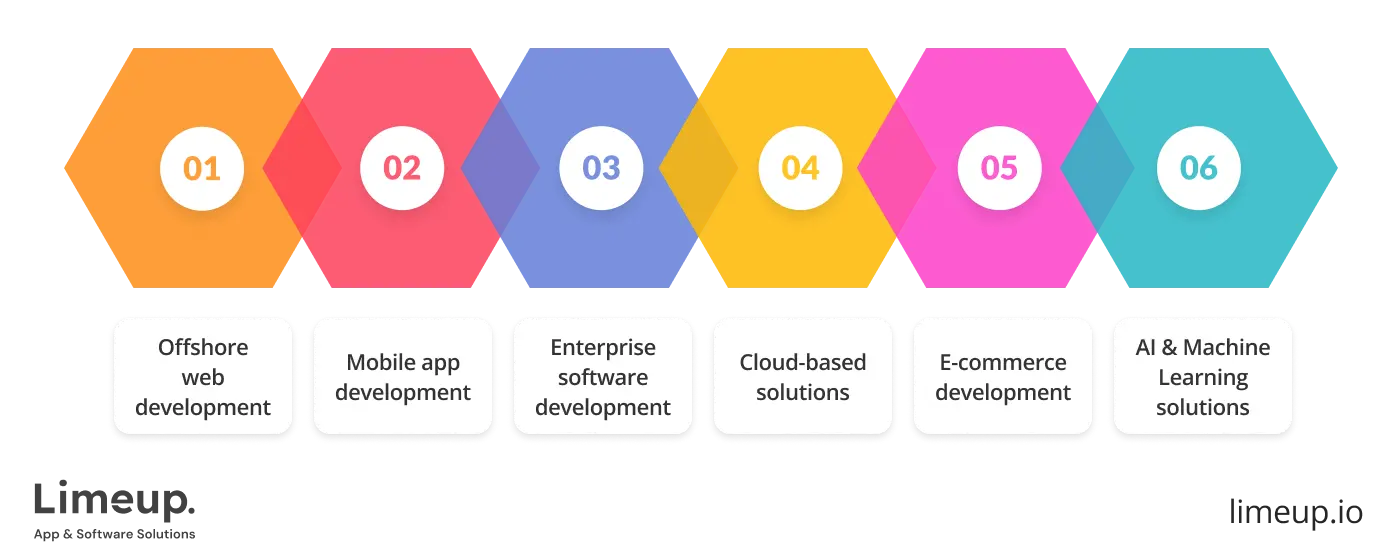
Offshore web development
Offshore web production is about designing websites and web applications from the frontend layout to backend programming and database management by international teams. The companies benefit from the creative and technical diversity that these offshoring professionals bring on board to provide robust, easy and creative websites, they choose to outsource software development offshore.
Since working on such kind of development is usually done across different time zones and cultures, that itself may build a basis for further innovative solutions and new insights. An offshore web project is initialized with a deep understanding of the client’s requirements and followed by design, development, test and deployment phases. Businesses may get high-quality web solutions while keeping efficiency intact and taking care of time-to-market delivery.
Mobile app development
Offshoring for mobile development helps businesses borrow expertise around the globe in the creation of innovative and functional applications across versatile iOS and Android platforms. The offshore developers provide end-to-end solutions in terms of design, development, testing and maintenance.

This type of development involves understanding the user persona, designing the interface, coding and rigorous testing to come up with a high-standard, user-anticipated app. Offshore software development company also provides post-launch support and updating of the app so that it remains relevant and bug-free. Organizations are able to use the rich talent pool from all over the world to build top-tier applications for better customer satisfaction.
Offshoring enterprise software development
Offshoring enterprise software production concentrates on the development of large-scale applications that are custom-developed for organizational operations or other processes. It primarily brings into the fold customized ERP and CRM development, as well as other special solutions for heightened efficiency and productivity of the enterprise.
By productively collaborating with businesses to comprehend what makes them tick, the offshore teams create custom software solutions that accelerate company expansion. To take the most of experts’ knowledge and assets in building reliable systems to support uninterrupted operations and grow performance over the board, this kind of production may be done by an offshore software development team.
Cloud-based solutions
The adoption of cloud-based solutions has increased and as a result, offshoring has also become an attractive option for many businesses. Offshore software development teams bring to fruition scalable, secure and flexible cloud applications and services that use platforms like AWS, Azure and Google Cloud. Cloud migration, SaaS development and cloud infrastructure are designed to be at the cutting edge of business.
Through the use of global know-how, an offshore cloud-based solution serves to a business gain greater data accessibility, scalability and profitability. This strategy maintains the company’s competitiveness and nimbleness, enabling it to adapt to rapidly advancing technologies and shifting market conditions.
E-commerce development overseas
The overseas e-commerce development industry refers to full-scale online store and platform development for buying and selling products or services. The offshore software developers are adept at building reliable e-commerce programs comprising payment gateway setup, website design, shopping cart integration and security measures.

Businesses may produce flawless, user-friendly e-commerce operations with higher revenue and satisfy customers by employing talented international individuals. As an outcome, organizations may embrace the newest technological advancements and market trends to make sure that their e-commerce platforms are competitive and match the expectations of modern consumers.
AI and Machine Learning solutions
By offshore outsourcing software development AI and ML services, businesses are able to have access to specialist knowledge in these cutting-edge fields. The offshore teams’ domain is creating intelligent systems that have the capacity to analyze data, automate operations and offer predictive insights. The AI and ML solutions are tailored for different industries with the goal of refining decision-making and operational efficiency.
For a stronger competitive advantage, firms may develop state-of-the-art applications by using offshore talent and promoting innovation. Taking a worldwide strategy to the endeavor will guarantee that businesses are leveraging artificial intelligence and machine learning to achieve transformative outcomes and are at the forefront of technological progress.
Pricing for software development offshoring
You could have noticed the broad variations in the offshore development rates from your search. Many factors influence the final cost. Let’s look at the elements that determine offshore developer rates.

Region. One of the many factors that affect the price of offshore custom software development is the location of the partner. Because of a lot of reasons like the cost of living and experience of the developers, prices of software development services vary in different countries.
| Region | Countries | Rates |
| North America | USA, Canada | $100–$450 |
| Latin America | Argentina, Brazil, Mexico, Panama | $20 – $ 55 |
| Western Europe | Belgium, Germany, France, Ireland, Netherlands, Norway, UK, | $150–$400 |
| Eastern Europe | Bulgaria, Czech Republic, Hungary, Poland, Romania, Slovakia, Ukraine | $25–$199 |
| Central Asia | Kazakhstan, Uzbekistan, Tajikistan | $10–$59 |
| South and Eastern Asia | China, Indonesia, Malaysia, Philippines, Vietnam, Japan | $10–$350 |
| Africa | Morocco, Kenya, Nigeria, Egypt, Ethiopia | $10–$99 |
| Australia | Australia | $100–$350 |
Timeline. Projects with tight deadlines or requiring rapid development may incur higher rates due to the need for expedited work and additional resources. Conversely, a longer timeline may sometimes allow flexibility in the pricing because the workload will be spread over a more extended period.
Type of cooperation. The type of cooperation model you choose can make a big difference in the price. Going for a dedicated team vs working under a project-based strategy may have an effect on overall costs and resource allocation. Understanding offshore software development meaning helps in selecting the method that best aligns with your business objectives and budget constraints.
Fixed-price model will work perfectly for projects with a well-defined scope, where expenses may be estimated easily in advance. However, any changes in the project will come at extra costs, and this is a matter that the parties must discuss and agree on.
With a dedicated team offshore software development model you are able to hire professional offshore software programmers to work on your projects full-time from overseas. It has advantages in cost control, flexibility and access to skilled developers, therefore it makes it very suitable for long-term projects.
Taxes. The offshore software creation rates could also be influenced by taxes among other factors. For instance, there might be some countries where value-added tax is applied to software development services, which increases the overall cost.
The standard rate of VAT in Ukraine is 20%. Since IT services are not subject to Value Added Tax, it, therefore, makes the destination of Ukraine very friendly for tax purposes when using offshore software dev.
Tech expertise. The impact of the kind of tech stack and programming languages used for offshore software development affects how much developers charge per hour. The fact that specialized programming languages are used in making solutions means an offshore web developer will charge more than a professional with general skills.
Some platforms or technologies will also demand special training and experience, which will raise the price. For example, if you are working on a logistic project, it will have to involve an offshore developer with more experience in security procedures — it will definitely be needed and more expensive as well.
Project scope. The larger the project or more sophisticated solution the more time and resources it requires. Since more intricate planning and execution must be undertaken, the rate escalates with the complexity of the functionalities, integrations or customizations.
Offshore Software Programming vs. In-house Software Development
As reported by Statista, 64% of companies outsource part or the whole software development project to external contractors. Now, let us take a look at the difference between offshore and in-house software development to guide you to make the best decision regarding the needs and requirements of your firm.
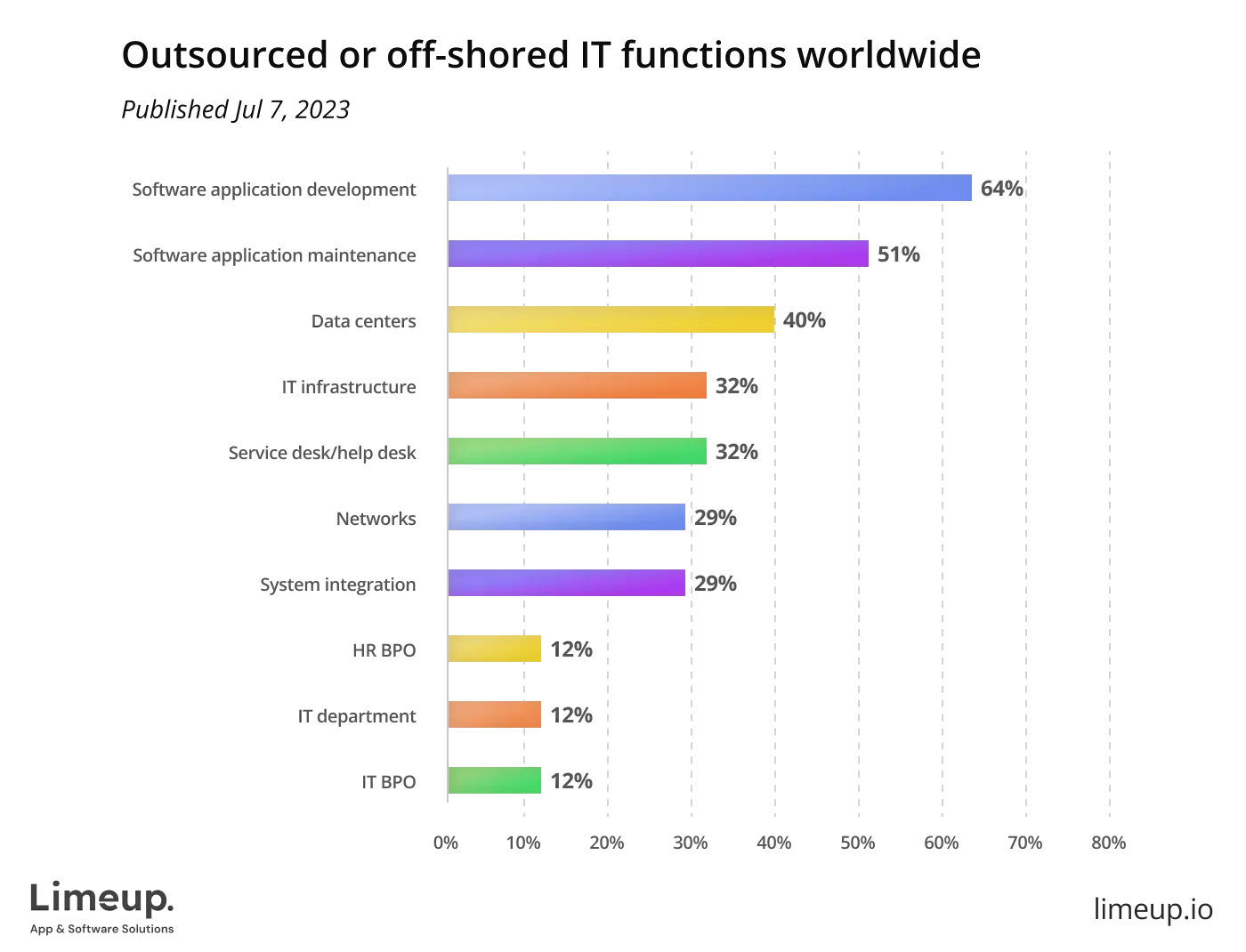
As far as internal staff is concerned, you take responsibility for bringing in staff to the software development process or recruiting people if there is a need for more workers with the proper skill set. You personally build a team which is going to be a part of your company. In contrast to this, instead of managing the whole process of hiring and integration yourself, you will partner with an offshore software developer who will provide you with experienced developers.
Ninety percent of the time, businesses hire new employees because they lack sufficient employees with the proper skills in-house. Therefore, you will need to post job advertisements, collect and screen resumes, conduct interviews with prospective employees, arrange for onboarding and so on. Later you will have to pay for vacations, sick days, salary etc.
On the other side of the coin, there is an offshore software development market which is getting bigger and bigger. It enables even small businesses to get state-of-the-art software even if they cannot afford an in-house team. Thus, offshore development allows access to a pool of skilled workers in countries with lower labor costs.
One of the main differences between in-house and offshore dev is that with the in-house team, your talent pool is limited only to locally available resources. It may result in a lack of talent, more specifically in specialized skill sets. Diversity and new perspectives, both important elements that can get in the way of development and creativity, might also be hampered.
Offshore software development outsourcing may benefit from multiple time zones. When your in-house team is on holiday, the offshore crew can be working on the project, thereby keeping the ball rolling and providing continuity to the production work. This may translate into an accelerated time-to-market that enables you to gain a competitive edge over others and exploit commercial opportunities far more quickly.
| Difference | In-house | Offshore |
| Infrastructure | As the team becomes larger, you will have to find space either to expand a building or rent a new building. | Providers already have all the amenities and luxuries with them as if they are in their own homes. |
| Flexibility | Since you directly hire in-house employees, the reorganization of your teams could be a bit more complex and expensive. | You may take on a full team from offshore development businesses or you may expand your in-house developer team by one person. |
| Cost | The expense of in-house teams is neither rising nor falling. | Remote teams cut overhead, salaries and other related expenses. |
| Expertise | Because particular competencies could be in high demand, the hiring process might be lengthy and costly. | Talent proved much easier to find and recruit when it is outsourced. |
Essential factors of outsourcing software development abroad
There are some critical factors in outsourcing development abroad that have the potential to influence the outcome of the endeavor. Therefore, an understanding of these aspects is very relevant and important to maximize the benefits of offshore development and make sound judgments.
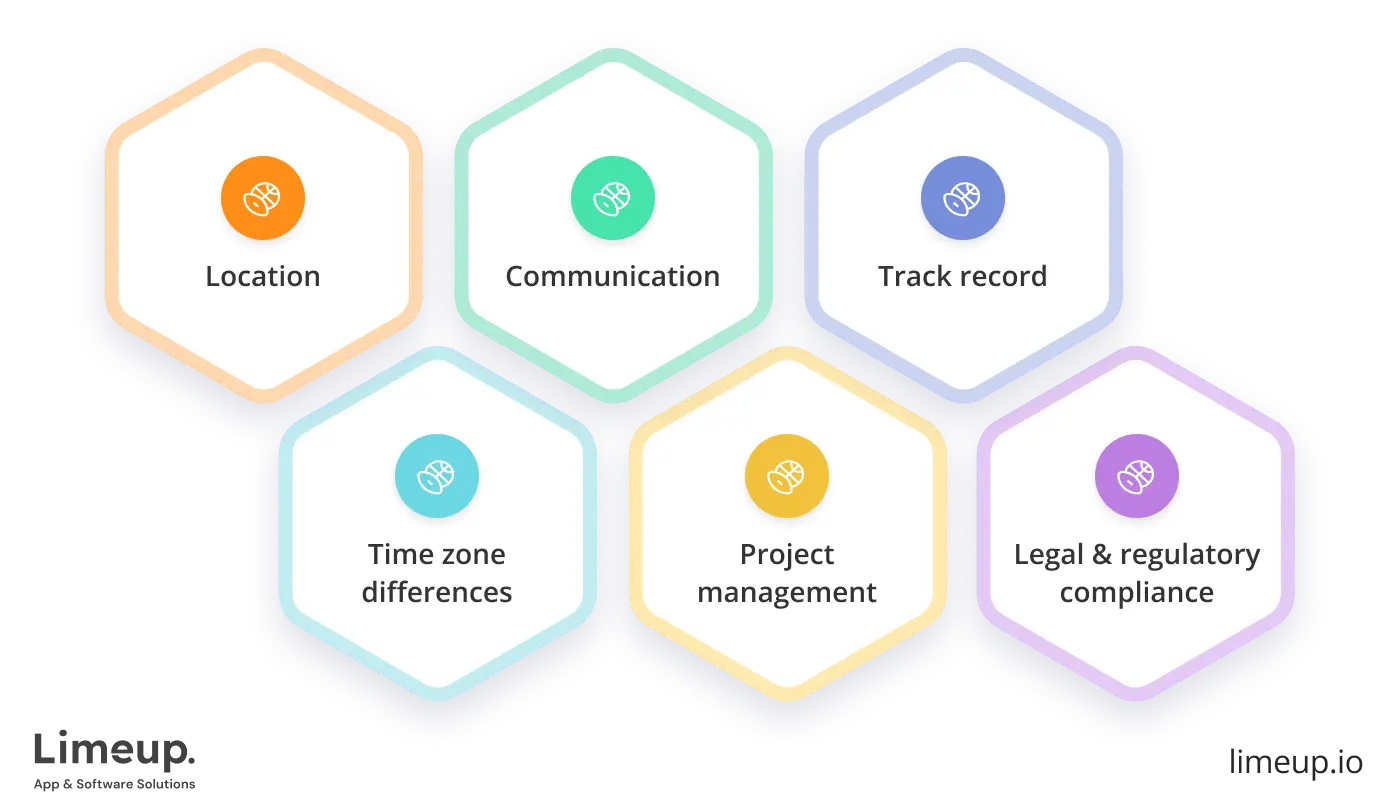
- Location. The geographical location can make or break the success of a venture. The time zones, subtle cultural differences and technical proficiency of multiple regions vary. Picking the right location that best fits your company’s operational hours and that has a robust talent pool will be of prime importance.
- Communication. Successful software development offshoring is largely about effective communication. Factors to consider include language proficiency, availability of adequate channels, the frequency of updates and the possibility of misunderstanding, which may lead to crossed wires on the project and delay it.
- Time zone differences. Time zone differences are sometimes a boon and sometimes a bane. Yes, you will get 24-hour work done but you will have to put in an extra effort to ensure meetings and updates are done on your convenience timings.
- Project management. Effective project management practices will keep the project running on track when offshore software development outsourcing. These include clear role definition, setting milestones, monitoring, handling issues and using project management tools in carrying out the process.
- Track record. What becomes really important is the background and history of the offshore team, particularly with respect to on-time delivery and working within the budget. Their past performance should be researched and references might be sought to know if they are really with their salt.
- Legal and regulatory compliance. When outsourcing globally, diverse legal and regulatory frameworks must be taken into account. To prevent getting into any legal hot water, it really matters to check the offshore staff complies with all relevant data protection rules, intellectual property rights and contract laws.
The future scope for growth and transformation of the offshore development industry is huge. Next, we will take a look at trends that are going to shape the future of software development services.
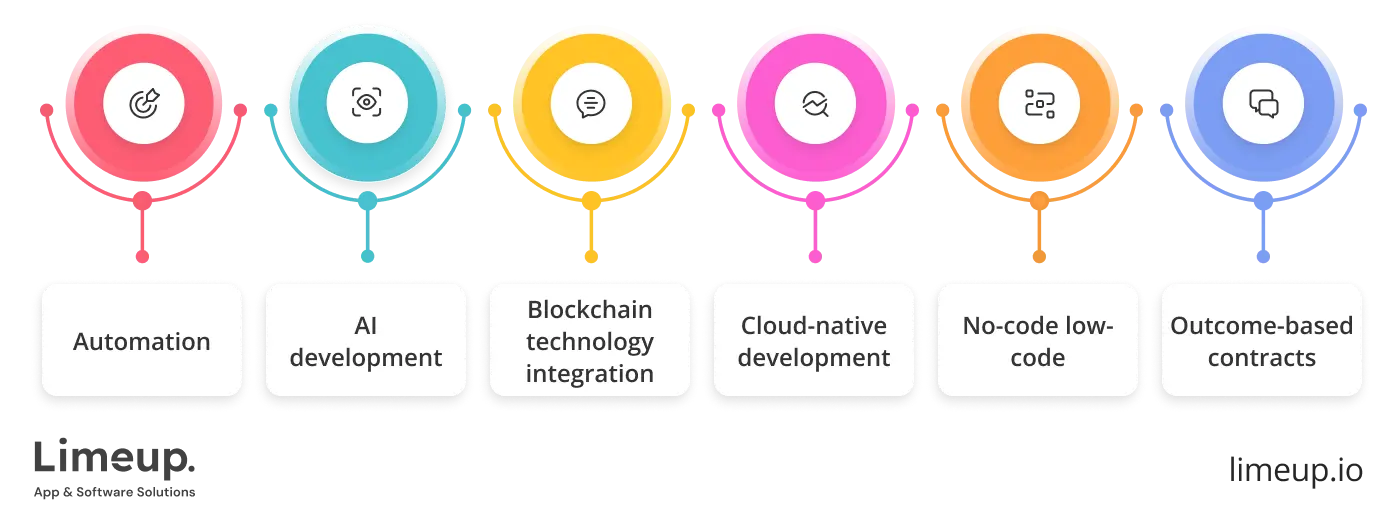
Offshore development has raised its productivity tenfold since automation became feasible. Special tools offer clues about how much of simplification that went into hard activities may be tied back to automation. They automate time-consuming operations making them faster and more efficient. For example, such technologies are able to automate coding processes and boost workflows, giving offshore software programmer much-needed time.
Beyond particular technologies what is at stake here is a general trend in the industry toward more automation in software development. By incorporating such tools wisely, offshore teams maximize productivity and creativity in their initiatives.
An increasingly relevant topic in the offshore development software sector is artificial intelligence(AI). McKinsey Global AI survey showed that 65 percent of responders reported that their firms are applying generative AI on a regular basis — it is twice as high compared to the report from ten months ago.
AI is useful as it may do some of the tedious, simple development tasks, freeing a developer’s time for more challenging problems. Stated another way, the most important thing is not to try to replace programmers but to give them better tools. AI is used by offshore software teams to speed up processes and increase quality.
Blockchain is admittedly related to cryptocurrencies up until this point but is progressively expanding into a number of sectors. Any offshore software development services are expected to incorporate blockchain to deliver secured and transparent solutions, especially for sectors like supply chain, healthcare and financial.
Blockchain may be seen as useful in the list of tools that may enhance security, transparency and traceability for offshore software specialists. More and more clients looking for cutting-edge and safe solutions will go to software development companies specializing in blockchain technology.
In offshore software dev, the cloud-native approach is gaining ground and becoming very popular. Revenues and benefits are skyrocketing due to the great scalability and flexibility of this method. The use of such platforms will help in smooth, easy and fast deployments, which in turn will quicken and streamline the release process.
It also makes the most of computing and storage capacity by optimization of these resources. To top it off, there is a stronger collaboration coming from various teams placed in different geographical locations, which goes hand in hand with improved teamwork and productivity.
Another trend in software development through offshore is the surge in the popularity of low-code and no-code development. Research suggests that this rising tide of low-code adoption by businesses across the board will likely reach new heights surpassing 80 percent within the next decade. These are methods that heavily rely on easy-to-use graphical interfaces, which make software development easier to be done by developers with less working effort.
Even though they make the process easier, they still require a deep understanding of the logic and other basics to come out with good results. Low-code and no-code development, that makes use of pre-built functions and libraries to enable quick adaption to market changes, reduces reliance on traditional coding and assures quick product launches.
Offshore software programming is slowly shifting towards value-based pricing, which benefits both the client and the service provider. Outcome-based pricing puts the ball in the client’s court by rewarding them for paying for outputs rather than inputs. When both parties pull together towards common goals, collaboration increases and accountability and transparency rise.
Benefits of creating software with offshore team
Offshore software outsourcing has a lot to offer to business owners, gaining popularity around the globe. The advantages of offshore software production in terms of money, technology and organization apply to large and small businesses.
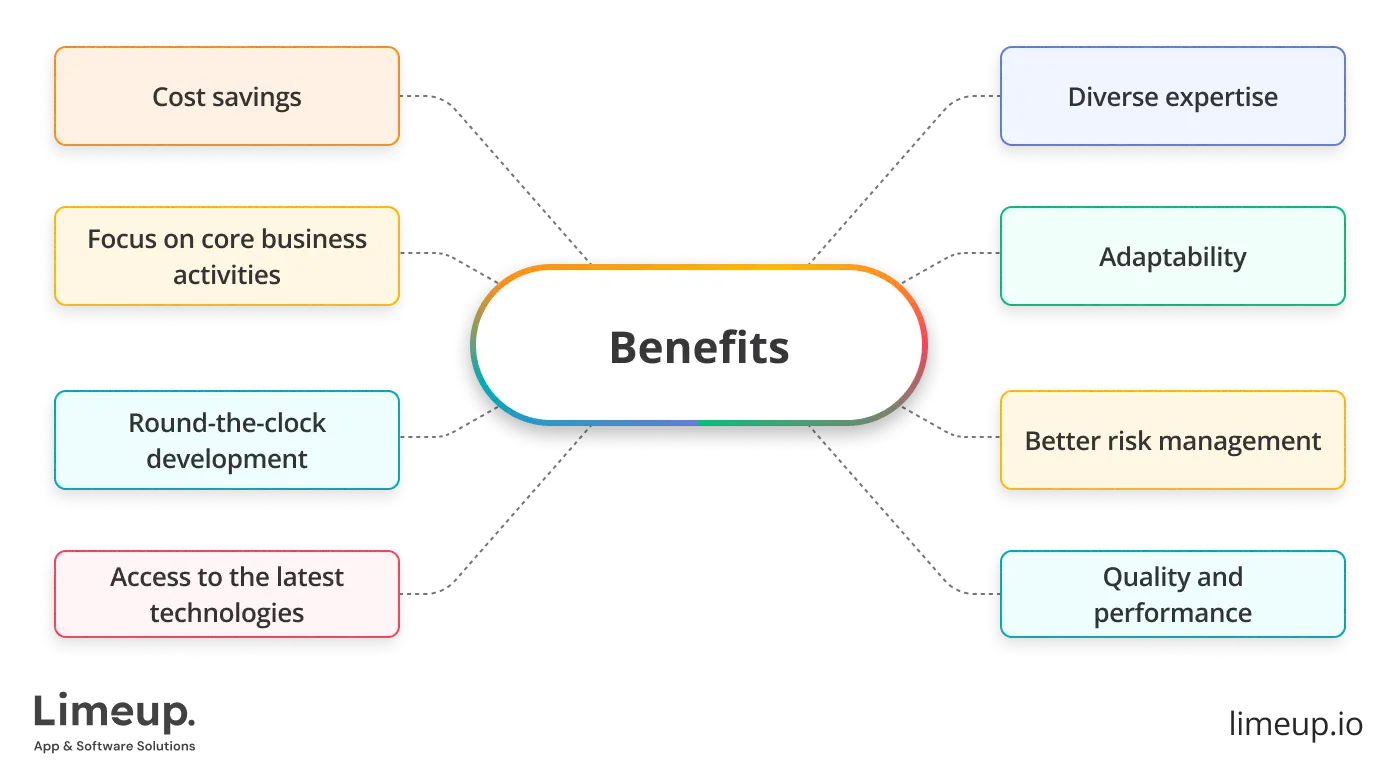
Cost savings. Probably one of the biggest pros of offshore dev is cost-effectiveness. Making use of lower labor costs in other countries allows companies to keep their budgets in check without compromising quality.
Focus on core business activities. Offshore custom software development lets your in-house team zero in on the main business processes. Your primary resources stay laser-focused on strategic tasks driving growth and innovation while the offshore team handles developing work.
Round-the-clock development. Time zone differences may be also utilized to have round-the-clock development. This round-the-clock productivity promotes quicker project completion and can maintain momentum after your local crew leaves the office.
Access to the latest technologies. Offshore software development companies frequently have access to contemporary technology. They may implement advanced tools and methods, confirming that your software developed employing the most recent advancements in the industry. Such a technologically astute strategy could give your project a commercial advantage.
Diverse expertise. Having access to a worldwide talent pool gives you an entree to a wide range of skill sets. In general, offshore teams bring great experiences from different industries and projects to make you endeavor more innovative and empower your project with new perspectives.
Adaptability. Software development through offshore provides the opportunity to increase and decrease development capacity as per the requirements of a business. It also ensures that you may quickly respond to variations in the specification of projects or the market condition, so your development stream is flexible and lean.
Better risk management. Offshore software engineering will also strengthen the risk management framework by distributing tasks and responsibilities geographically. This sort of geographical diversification is an insurance hedge against the risks from disruptions in local issues. In this way, companies will not keep everything in one basket which will enable them to handle challenges more effectively and ensure steady progress.
Quality and performance. Most teams who are situated offshore have vast experience and dedication to only software development which subsequently ensures high-quality results. On account of such expertise, companies may hit the ground running to higher standards and more reliable performance.
To sum up
Software development via offshore is among the most powerful strategies that will help companies increase their development capabilities by borrowing from global talent and expertise. The comprehensive guide above has elaborated on different aspects of this approach, underscoring its potential for cost savings and increased efficiency.
Careful planning and management are the steps to successful offshore software dev. It calls for a solid framework of project management, clean communication channels and clear insights regarding legal and regulatory standards. Addressing these challenges before time, if implemented properly, may reduce associated risks to a minimum and help businesses derive maximum benefit from their offshore partnerships.
Enterprises and small businesses may retain competitiveness and agility in the changing technology environment simply by leveraging offshore resources. By harnessing the benefits of offshore software development, companies can take advantage of the flexibility offered by these teams. By that, the recruitment of the offshore team might allow for business to ups or downs according to conditions, keeping the quick and lightweight process of creation.
Offshore development of the software is an attractive proposition for firms that seek to get the best of talent to enhance the construction of their capital trying to asses the overall costs associated with talent and rationalizing development processes. This precise selection ensures they have the capacity to weather any storm and secure a long-term future in the fiercely competitive global market.

